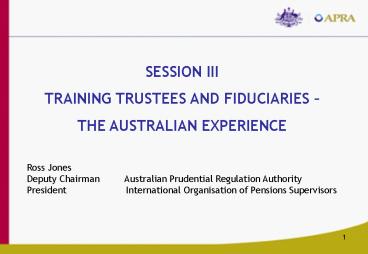TRAINING TRUSTEES AND FIDUCIARIES - PowerPoint PPT Presentation
1 / 13
Title:
TRAINING TRUSTEES AND FIDUCIARIES
Description:
New operating standards were introduced which covered trustee duties and obligations. ... While fitness can to some extent be considered on a collective basis, propriety must be ... – PowerPoint PPT presentation
Number of Views:21
Avg rating:3.0/5.0
Title: TRAINING TRUSTEES AND FIDUCIARIES
1
SESSION III TRAINING TRUSTEES AND FIDUCIARIES
THE AUSTRALIAN EXPERIENCE Ross Jones Deputy
Chairman Australian Prudential Regulation
Authority President International
Organisation of Pensions Supervisors
2
Outline
- Requirements of fit and proper.
- What we expect from trustees.
- Supervision how do trustees look after their
funds?
3
Trustee structure
- Trustees hold superannuation/pension fund assets
on behalf of fund members by a trust structure
and owe a fiduciary duty to members. - Trustees have a duty to act in the best interests
of those members. - Except where the trustee is totally independent
of the members and the employer, the trustees
must comprise an equal number of trustees or
directors nominated by employers and employees.
4
Trustee skills
- Directors or trustees, especially the
representatives of the employees are drawn from
pools of people who may not have the expertise,
knowledge or experience initially to oversee the
operation of the fund. - Consequently, APRAs supervision activities focus
heavily on how trustees act in looking after the
funds that they are responsible for.
5
Licensing of trustees
- In 2004 Australia introduced licensing
requirements for trustees and funds. - New operating standards were introduced which
covered trustee duties and obligations. - Trustees must comply with a fit and proper
operating standard which at its most basic level
requires that trustees understand what they are
doing and act honestly.
6
Trustee core skills
- Understanding of legal environment.
- Investment, insurance and taxation requirements.
7
APRAs approach to core skills
- No mandated tertiary education requirements.
- Expectation that trustee will identify skill
needs and undertake training. - Fitness can be met collectively.
- Trustee must identify, review and renew required
skills to ensure fund is managed prudently. - Trustee not APRA chooses method meeting of
training requirements.
8
Propriety
- Trustee must operate properly in the discharge of
its obligations. - While fitness can to some extent be considered on
a collective basis, propriety must be met on an
individual basis.
9
Minimum standard of propriety
- Legislation provides a minimum statutory test.
- A disqualified person cannot be a trustee.
- A disqualified person is a person who has been
convicted of an offence or has been subject to a
penalty in relation to dishonest conduct or is
insolvent or has been disqualified by APRA.
10
APRAs approach to trustee propriety
- Trustee policy specifies standard of behaviour
and conduct. - Trustees then conduct tests against their
standard. - Trustees must have a process to deal with failure
to meet their standard. - Trustee must have a policy regarding conflict of
interest.
11
Outsourcing
- The Australian industry has a high level of
outsourcing of key functions to third party
service providers. - Trustees often outsource investment consulting,
investment management and fund administration. - Each outsourced arrangement must be evidenced by
a legally binding written contract. - Trustees must show that the outsourcing
arrangements are in the best interest of members
as compared to performing the functions
themselves eg. managing conflicts of interest.
12
Risk management requirements
- Risk management strategy deals with risks at the
trustee level and covers risks arising from
governance and decision making, outsourcing
risks, risks arising from changes to the law and
risk of theft and fraud.
13
Risk management requirements
- Risk management plan is required at the fund
level and should deal at a minimum with the risks
to the investment strategy and financial
position, and the risks associated with
outsourcing arrangements. - Risks must be identified and evaluated in terms
of both the likelihood and consequence of the
risk.















![[PDF] Governance as Leadership: Reframing the Work of Nonprofit Boards (PDF) PowerPoint PPT Presentation](https://s3.amazonaws.com/images.powershow.com/10107243.th0.jpg?_=20240824045)















